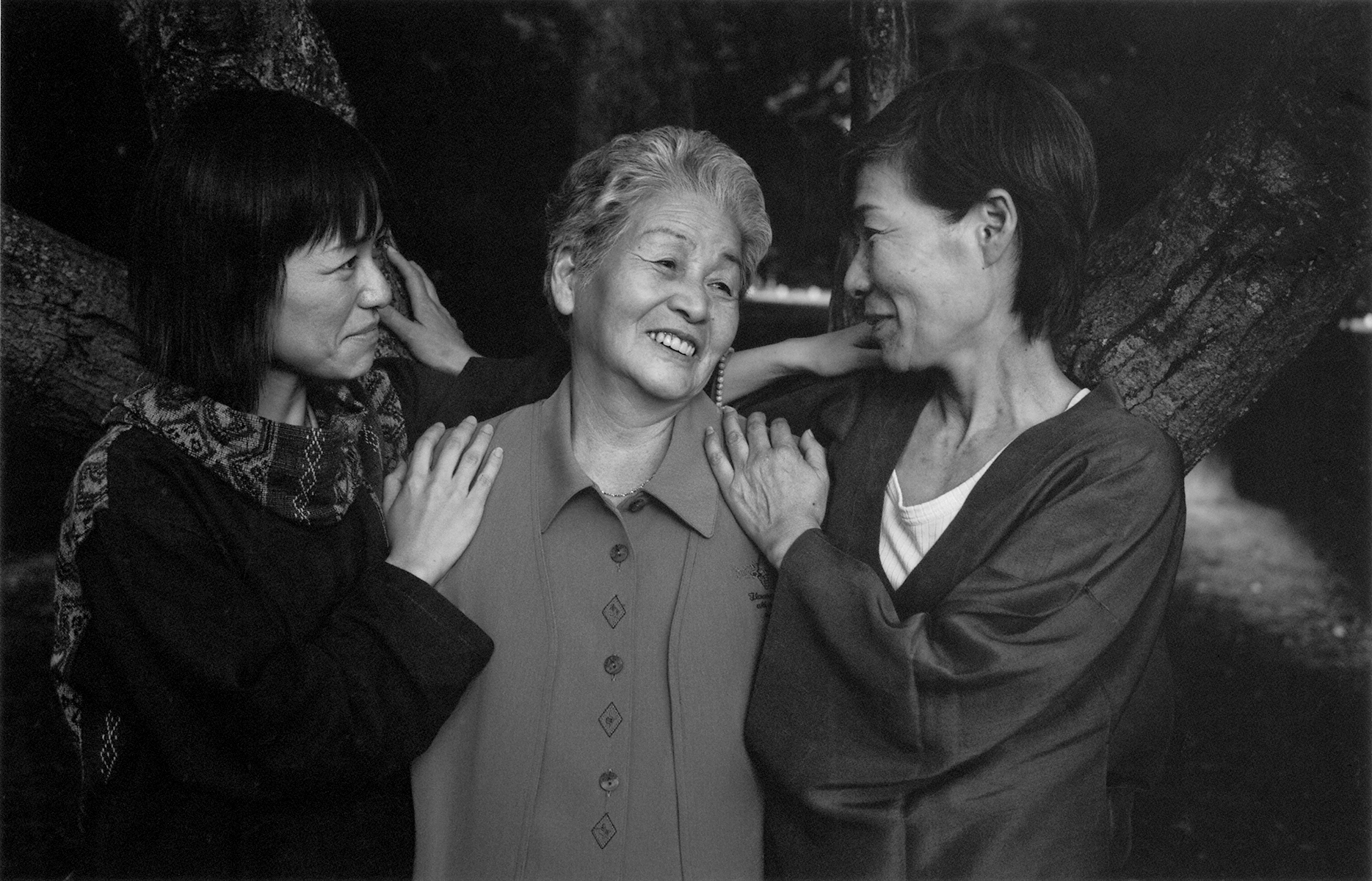
熊本理抄
わたしの中にはいつも、たくさんの傷を背負った「わたし」がいます。そんな「わたし」にとって、自分を「語る」ということは、自分の生い立ちの中 でふたをしてきた体験や事実、感情を思い起こして、一つひとつ丁寧にひもといていくことから始まりました。自分がつくる「物語」の中ではなく、「現実」の 中で生きる人びとの息吹を感じたとき、人びとの痛みを分ちあったとき、喜びを共にしたとき、人間としてのすてきな出会いとつながりに触れたとき、「聴く」 こと、「語る」こと、「聴いてもらう」ことは力となりました。自分の中にうごめいているけれども、でも、あえて見ないようにしてきた、あるいは見ないよう にさせられてきたトラウマが、大きなあくびをしながら長い長い眠りから覚めるのを感じました。自分の中に起こる変化に気づいてきました。他者と交わること は、苦しみながらも通いながらも揺れながらも、自分を発見し、豊かにし、自分で自分を作っていこうとする過程でした。わたしの中にいる「わたし」を 「ぎゅっ」と抱きしめて、その傷を自分自身の力や他者の助言などを通じて回復させようとする癒しの行為でした。そして、ただ単に被差別体験を癒すという個 人的な枠内にとどめるのではなくて、被差別の非合理を撃ち、社会を変え、差別をなくしていくという、人間としての誇りを求めるために語りつづけています。 抑圧される自分を解放するだけではなくて、抑圧する自分をも解放するために。それは、差別の痛みを知り、人間の暖かさを知り、他の差別への思いも同質・同 次元で馳せることのできる、反差別の立場を貫いていくことへの誇りでもあります。
そして今、一番語りたいのは、近くて遠い、遠くて近い家族です。「いいこ」を演じつづける「娘」ではなく、「孫」ではなく、「お姉ちゃん」ではな く、自分の人生を自分で考える回路を持ち、自分のことを自分で定義する言葉をもつために。社会の問題を被差別者個人の問題にすりかえ、さまざまな思いや体 験を抱えて生きる祖父、祖母、母、弟を、差別し続けていた自分を解放し、「人間として」もう一度出会いなおすために。
寺岡ミカ
私は、おんとし83歳。この年代の日本人は、男尊女卑の時代の人間なので、ただただ、我慢の日々。
夫の親にはひたすらつくし、夫には何の反抗もできず・・・。
あまりに我慢の時間が永すぎて、安らぎを求めるには宗教しかなく、いまだに仏教をひたすら信じております。しかし、字も書けず、この年になります と、一人で耐えてきました分、我も強くなり、がんこにもなります。今のところ、年の分、あちこちと、がたはきましたが、まだまだでございます。
熊本礼子
母としてのこれからの人生を、二人の子どもに迷惑をかけずに生き抜くことを、50歳を過ぎた今、とても強く願う。夫のいない、子どもにとっては父 親のいない人生を送り続けて25年目を迎えようとしている。子どもの小さい自分は、ただただ、働き続けてきたが、子どもを育てたのではなく、子どもに育て られたような気がする。だからといって、子離れができないわけでもなく、親離れできずにいるのでもない。つかず離れずのこの距離感がいいのかもしれない。 子どもが小さい時には、ただただ、可愛くて可愛くて、それでいて、子どもの意見だけには先に耳を傾けて・・・。
母(日本の女性)とは、ただただ、じっと我慢をして、子どものすること、言うことをじっと見ているだけ。何も口うるさく言う必要はない。“ここぞ” と重うときのみに叱ればよいのではないか。子どものこれからの幸福を願うのであれば、母であるわたしは、元気で、自分を生きることを身につけていくことだ と思う、今日このごろ!!
子はいくつになっても“子”。自分がつらくて苦しいことがあると、子のことが頭に思い浮かぶ。元気でいるか。
わたしにとっての子どもは教育者である。差別の中で生まれ育ったわたしは、差別を嫌と思わず、差別の中で生まれ、育って、よかったとすごく思う。差別をされる側、差別をする側。その二つの目を持てたことを今は幸福に思う。
わたしは、自分の母をこよなく愛している。83歳になる母はがんこで、我が強くなっているが、それでも母が好きだ。わたしの子もいくつになっても、わたしのことをこよなく愛してくれるだろうか?わたしが娘のことをいつまでもこよなく愛するように・・・。
KUMAMOTO Risa
Inside of me there is always an “I” burdened with many wounds? For that “I,” to “talk” about myself began with recalling the experiences, facts, and emotions of my life which I had put a lid on and carefully sifting through them. When I felt the energy of people who live in “reality,” when I shared in people’s suffering, when I felt joy with them, when I came in touch with a wonderful meeting and connection as a human being—not in the “story” that I created—the acts of “listening,” “talking,” and “being listened to” strengthened me. I felt the trauma writhing within me, which I had purposely tried to ignore or had been forced to ignore, awaken from its long, long sleep with a huge yawn. Engaging with others was part of the process of my attempt to create myself by discovering myself and becoming enriched while in the midst of suffering, faltering, and wavering. It was a soothing action to tightly embrace the “I” within me in an effort to heal the emotional wounds through my own power and through support from others. And I will continue to speak out so that I will not merely keep this within my personal framework of comforting myself for the discrimination I have experienced, but, rather, so that I can go beyond this and take aim at the irrationality of discrimination, to seek honor as a human being who works to change society and do away with discrimination. I do this not only to liberate myself from oppression, but also to liberate myself from being the oppressor. Knowing the pain of discrimination and knowing the warmth of people, I feel proud to pursue my stance of anti-discrimination by treating my discriminatory feelings as having the same quality and being of the same dimension.
What I want most to speak of now is my close yet far and far yet close family. Not as one who persists in acting the “good child” as “daughter,” or “grandchild,” or “big sister,” but in order for me to have a process of thinking about my life on my own and in order to obtain the words to define myself on my own. In order to liberate myself from having discriminated against my grandfather, grandmother, mother, and younger brother who lead their lives bearing various thoughts and experiences and who have substituted the individual problem of those being discriminated against for the social problem of discrimination; and to relate to them anew “as human beings.”
TERAOKA Mika
I am 83 years old. My era was one of dominance of men over women, so my days were those of constant perseverance and restraining my own desires.
I served my husband’s parents single-mindedly, and I couldn’t defy my husband in any way. . . .
I spent so long persevering that the only peace of mind I could attain was through religion, and I am still a fervent believer of Buddhism. But I do not know how to write and, at this age, having endured so patiently, I have become strong and obstinate. My aging body has become creaky in places, but I’m still going strong.
KUMAMOTO Reiko
Now that I am over 50, I have a strong wish to live my life into the future without causing problems for my two children. It has been 25 years that I have lived without a husband, and for my children without a father. When the children were young, all I did was work, but I feel that it was not I who raised my children, rather it was my children who raised me. That doesn’t mean that my children haven’t been able to become independent or that I haven’t been able to let go of them. Being not too close and not too far may be the right distance from each other. When my children were small, I felt that they were such darlings that I listened first and foremost to their wishes.
A mother (a Japanese woman) must have infinite patience and can only silently watch what her children do and say. There is no need to nag them. It should be enough to scold them only at crucial times. These days I think that if I am to wish for my children’s future happiness, as their mother I must learn how to live a healthy life on my own!!
No matter how old they become, one’s children are always one’s children. When I face painful and trying times, it is my children who come first to mind. I wonder if they are well.
To me, my children are my educators. As one who was born and who grew up in discriminatory surroundings, I feel fortunate that I do not resent the discrimination or the fact of having been born and raised under discrimination. The side who is discriminated against and the side who discriminates—I am able to think I was fortunate to have known both viewpoints.
I love my mother very deeply. At 83 she is obstinate and has become strong-willed, but I still love her. Will my children love me so profoundly no matter how old I become? Just as I will always love my daughter deeply . . . .
translations by Beth Cary
